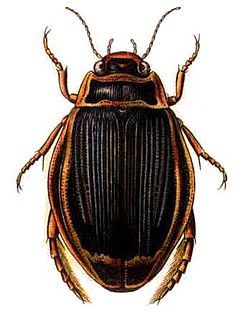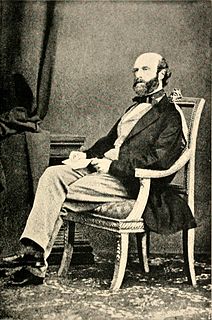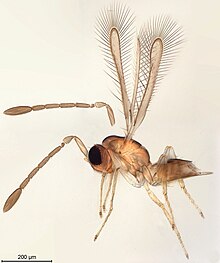
Chalcid wasps are insects within the superfamily Chalcidoidea, part of the order Hymenoptera. The superfamily contains some 22,500 known species, and an estimated total diversity of more than 500,000 species, meaning the vast majority have yet to be discovered and described. The name "chalcid" is often confused with the name "chalcidid", though the latter refers strictly to one constituent family, the Chalcididae, rather than the superfamily as a whole; accordingly, most recent publications (e.g.,) use the name "chalcidoid" when referring to members of the superfamily.

Dytiscus is a Holarctic genus of predaceous diving beetles that usually live in wetlands and ponds. There are 26 species in this genus distributed in Europe, Asia, North Africa and North and Central America. They are predators that can reduce mosquito larvae.

Alexander Henry Haliday was an Irish entomologist. He is primarily known for his work on Hymenoptera, Diptera, and Thysanoptera, but worked on all insect orders and on many aspects of entomology.

The Mymaridae, commonly known as fairyflies or fairy wasps, are a family of chalcidoid wasps found in temperate and tropical regions throughout the world. The family contains around 100 genera with 1400 species.
Signiphoridae is a small family of parasitic wasps in the superfamily Chalcidoidea. The roughly 80 species are placed in four genera.

Alexandre Arsène Girault was an American entomologist specializing in the study of chalcid wasps. An eccentric and controversial figure, Girault was also a prolific and dedicated entomologist. He published more than 325 papers and described over 3000 new taxa from Australia.
Ceranisus is a genus of hymenopteran insects of the family Eulophidae. They are parasitoids of thrips of the order Thysanoptera and may be important in their biological control.
Ablerus is a genus of chalcid wasps formerly belonging to the family Aphelinidae. The genus was created by the American entomologist Leland Ossian Howard in 1894 for the species named in that year by William Harris Ashmead as Centrodora clisiocampae. The genus Azotus was synonymized with Ablerus by Alexandre Arsène Girault in 1913 and Hyatt synonymized Myocnemella with Ablerus in 1994, leaving Ablerus as the sole genus within the subfamily Azotinae. Azotinae was elevated in rank in 2013 to become the monotypic family Azotidae.
Gordon Gordh is an American entomologist.

Mymarilla wollastoni is a species of fairyflies endemic to the island of Saint Helena in the southern Atlantic. It is the only species classified under the genus Mymarilla. They are characterized by smooth, shiny black bodies and densely hairy (setose) and domed forewings. They bear superficial resemblance to members of the genus Cremnomymar which inhabit similar habitats of remote wind-swept oceanic islands, but they are believed to be most closely related to the genus Stephanodes. They were first described by the English entomologist John Obadiah Westwood in 1879, from specimens collected from low-lying plants in Saint Helena.
Polynema is a genus of fairyflies or fairy wasps, insects in the family Mymaridae.
John Stuart Noyes is a Welsh entomologist.

Mymar is a genus of fairyflies in the family Mymaridae. There are about 10 described species in Mymar.
Neodusmetia sangwani is an encyrtid parasitoid from India that was used in classical biological control of the Rhodesgrass Scale, Antonina graminis (Maskell) (Pseudococcidae) which is a major pest of grasses outside of its native range in Asia. The parasitoid was successfully controlled the scale infestation in Texas in the 1950s and 60s. It is considered as one of the most successful examples of classical biological control.
Dicopus is a wasp genus in the family Mymaridae. About 15 species have been described in the genus.

Bokinakere Ramakrishnaiya Subba Rao was an Indian-origin entomologist who worked at the Commonwealth Institute of Entomology. He was a specialist on biological control and described many species of parasitic wasps including Neodusmetia sangwani which is considered one of the most successful examples of classical biological control. Rao also served as a linesman and umpire at Wimbledon from 1969 to 1995.
Marina Dmitrievna Zerova was a Ukrainian entomologist. Several insects have been named after her. She became Doctor of Biological Sciences (1980), Professor (1989) and Honored Worker of Science and Technology of Ukraine (2003). In 1981 she was awarded the Award of the National Academy of Sciences of Ukraine named after DK Zabolotny.
Plutarchia is a genus of chalcid wasp in the subfamily Eurytominae. Alexandre Arsène Girault first circumscribed the genus in 1925; its name honors Plutarch. The genus initially only comprised its type species, P. bicarinativentris, found in Australia. Subsequent species from South Asia and Nigeria have been described and transferred to Plutarchia.







